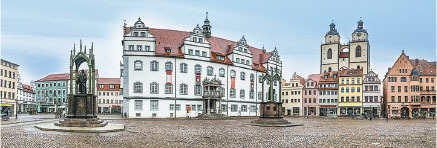Why the periphery isn’t so bad after all
It’s getting closer and closer to Oct. 31. For children, of course, this means the bacchanalia of Hallowe’en, but the religiously astute will also know it as Reformation Day – and that this year’s is the 500th anniversary version.
On that day in 1517 the monk and theological professor Martin Luther took up a hammer and nailed on the community bulletin board (the church door) a set of propositions (theses) he wanted to discuss with other scholars.
He wrote them in Latin for the learned, but someone recognized explosive material when he saw it, copied down the theses, translated them into German, and printed them without Luther’s permission for wide dissemination.
Boom went the dynamite, and the Reformation was on.
Theological scholars around the world are making public presentations this year on this explosion and its aftereffects, and I’m among them ransacking sources old and new to compose my lectures.
I recently enjoyed reading Maritimer Bruce Gordon’s biography of John Calvin. Gordon makes a number of important points in this book, such as that Calvin, for all his insistence on correct doctrine, also championed Christian unity and therefore advocated liberty in worship forms and other elements of church life so as to avoid division.
Gordon likewise shows how Calvin, not known for his flexibility, nonetheless frequently both advocated and practised accommodation – as he saw God doing in accommodating the great truths of the gospel to the limitations of our tiny intellects using the inspired words of the Bible.
Gordon also emphasizes Calvin’s laserlike focus on Scripture. Famous as he is for his multivolume work of systematic theology, The Institutes of the Christian Religion, Calvin saw this work as merely a helpful guide to the central task of scriptural interpretation.
Calvin devoted most of his teaching, preaching and writing to expositing book after book of the Bible (and remains one of the few commentators from centuries past commentators today regularly consult).
 Wittenberg PHOTO: TRAVELVIEW / SHUTTERSTOCK.COM
Wittenberg PHOTO: TRAVELVIEW / SHUTTERSTOCK.COM
Another truth shows up implicitly not only in Gordon’s book, but in his own life.
Sociologist Edward Shils famously emphasized the relationship of "centre" and "periphery," and the Reformation is a giant example of what he means. For the critical and creative springs of the Reformation did not emerge from the great centres of Europe – not in London or Paris, Rome or Castile, Prague or Vienna. The Reformation began on the periphery.
You would have had to peer closely at a map of 16th-century Europe to spot tiny Wittenberg (home of Luther and Melanchthon).
Zurich wasn’t much bigger (home of Zwingli and Bullinger and the Swiss Brethren ancestors of the Anabaptists).
Neither was Geneva (home of Calvin and Beza).
Admittedly John Knox and Thomas Cranmer served in their national capitals of Edinburgh and London respectively. But Knox gave credit to Calvin’s Geneva as the "perfect school of Christ" while Cranmer’s career, brilliantly fruitful as it was (especially in the form of the The Book of Common Prayer), was deeply compromised by proximity to one Tudor monarch after another.
No, the Reformation came largely from the periphery, not the centre – just as Bruce Gordon himself, now holder of the Titus Street Chair of Ecclesiastical History at Yale University, an intellectual centre without equal, was first a student in Nova Scotia at King’s College and Dalhousie.
Canada itself is decidedly peripheral to British, French and American cultural centres – and increasingly to Hong Kong and Beijing too.
Evangelicals, furthermore, who once constituted the centre of Canadian Anglophone society, are well out onto the periphery nowadays.
We Canadian Evangelicals could bemoan our lack of status and loss of influence. Those in the centre do get more attention and exert more clout.
But if we want to stay alive to fresh words from God, if we want to truly practise the principle of ecclesia reformata semper reformanda (the reformed church always being reformed, as Karl Barth put it), we will do better if we remain free of the inertial weight of the centre.
Great new things, after all, can come from little places such as Wittenberg or Geneva.
Or Halifax.
Or Nazareth.

John Stackhouse teaches at Crandall University in Moncton, N.B. His latest book will be released later this year – Why You’re Here: Ethics for the Real World (Oxford). Find more of his columns at www.FaithToday.ca/ChristAndCulture.